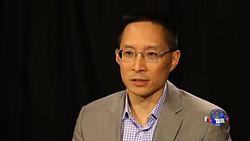Eric Liu Quote
This is why it is so fundamental for us right now to grab hold of this idea of power and to democratize it. One of the things that is so profoundly exciting and challenging about this moment is that as a result of this power illiteracy that is so pervasive, there is a concentration of knowledge, of understanding, of clout. I mean, think about it: How does a friendship become a subsidy? Seamlessly, when a senior government official decides to leave government and become a lobbyist for a private interest and convert his or her relationships into capital for their new masters. How does a bias become a policy? Insidiously, just the way that stop-and-frisk, for instance, became over time a bureaucratic numbers game. How does a slogan become a movement? Virally, in the way that the Tea Party, for instance, was able to take the "Don't Tread on Me" flag from the American Revolution, or how, on the other side, a band of activists could take a magazine headline, "Occupy Wall Street," and turn that into a global meme and movement. The thing is, though, most people aren't looking for and don't want to see these realities. So much of this ignorance, this civic illiteracy, is willful. There are some millennials, for instance, who think the whole business is just sordid. They don't want to have anything to do with politics. They'd rather just opt out and engage in volunteerism. There are some techies out there who believe that the cure-all for any power imbalance or power abuse is simply more data, more transparency. There are some on the left who think power resides only with corporations, and some on the right who think power resides only with government, each side blinded by their selective outrage. There are the naive who believe that good things just happen and the cynical who believe that bad things just happen, the fortunate and unfortunate unlike who think that their lot is simply what they deserve rather than the eminently alterable result of a prior arrangement, an inherited allocation, of power.
This is why it is so fundamental for us right now to grab hold of this idea of power and to democratize it. One of the things that is so profoundly exciting and challenging about this moment is that as a result of this power illiteracy that is so pervasive, there is a concentration of knowledge, of understanding, of clout. I mean, think about it: How does a friendship become a subsidy? Seamlessly, when a senior government official decides to leave government and become a lobbyist for a private interest and convert his or her relationships into capital for their new masters. How does a bias become a policy? Insidiously, just the way that stop-and-frisk, for instance, became over time a bureaucratic numbers game. How does a slogan become a movement? Virally, in the way that the Tea Party, for instance, was able to take the "Don't Tread on Me" flag from the American Revolution, or how, on the other side, a band of activists could take a magazine headline, "Occupy Wall Street," and turn that into a global meme and movement. The thing is, though, most people aren't looking for and don't want to see these realities. So much of this ignorance, this civic illiteracy, is willful. There are some millennials, for instance, who think the whole business is just sordid. They don't want to have anything to do with politics. They'd rather just opt out and engage in volunteerism. There are some techies out there who believe that the cure-all for any power imbalance or power abuse is simply more data, more transparency. There are some on the left who think power resides only with corporations, and some on the right who think power resides only with government, each side blinded by their selective outrage. There are the naive who believe that good things just happen and the cynical who believe that bad things just happen, the fortunate and unfortunate unlike who think that their lot is simply what they deserve rather than the eminently alterable result of a prior arrangement, an inherited allocation, of power.
Related Quotes
About Eric Liu
President Barack Obama nominated him in January 2015 to serve on the board of directors of the federal Corporation for National and Community Service and he was confirmed by the U.S. Senate; his term expired in December 2017.
